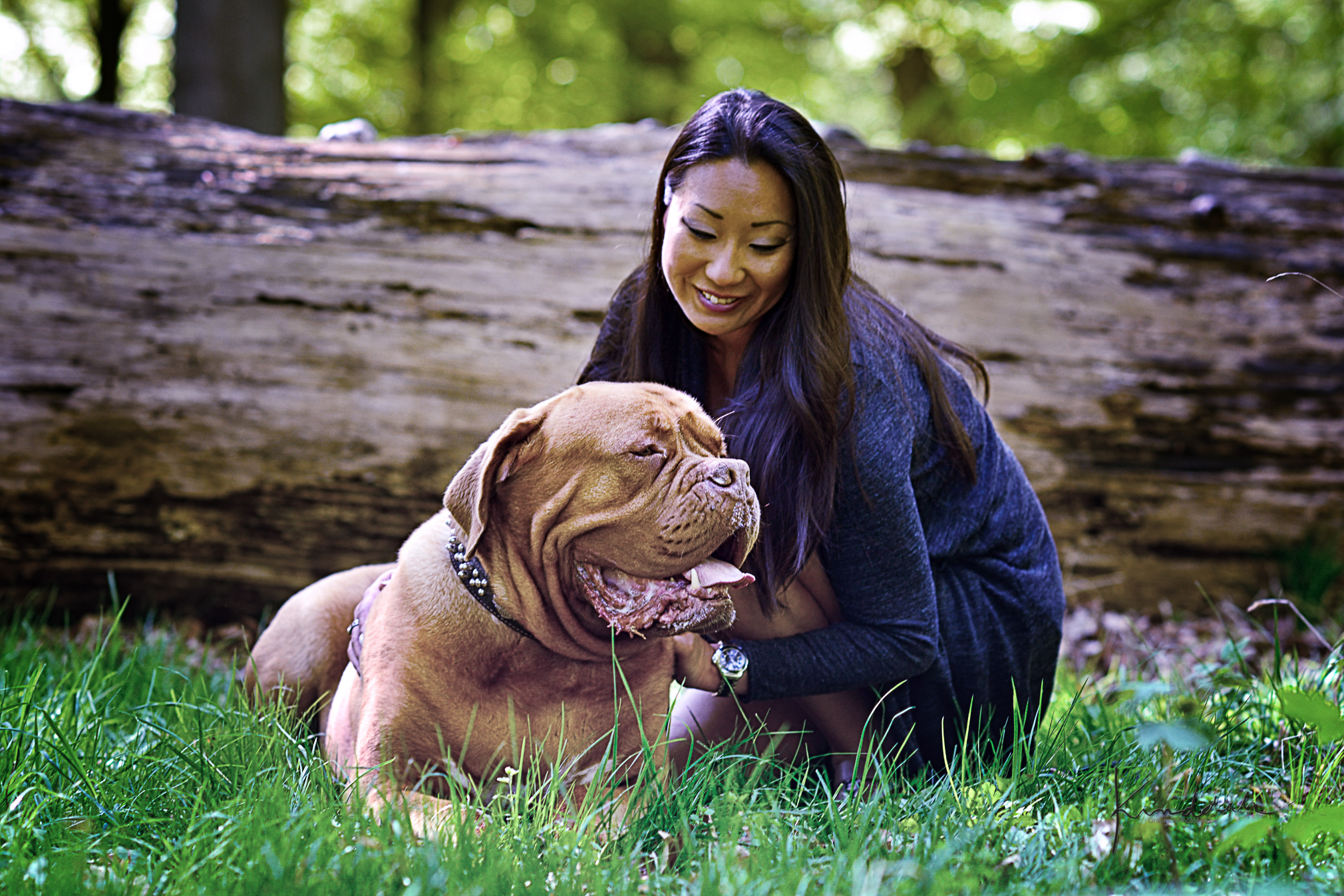How To Stop A Dog From Barking
by Ditte Young
Updated on September 22, 2023
Estimated reading time: 6 minutes
Barking is a common form of communication for dogs, and no one should expect their dog to never bark. Some dogs, however, bark excessively — and how to stop excessive barking is one of the most well-known problems many pet parents face.
If your dog barks too much, the first thing you need to do is identify the reason for your dog’s excessive barking. Barking serves a variety of functions, and only by identifying the reason for your dog’s barking will you be able to stop him from barking excessively.
This article will cover some of the most common reasons your dog might be barking excessively. We will walk you through why dogs bark, what might cause excessive barking, and how to stop your dog’s excessive barking.
Table of Contents




Why do dogs bark?
Dogs bark for many different reasons. Barking is a form of communication — this means that your dog barks to tell the people and dogs around him what he feels, wants, or needs.
For example, it’s perfectly normal for your dog to bark when calling out to other dogs, expressing emotions, wanting attention, being territorial, or reacting to unexpected or unknown sounds.
Some dogs, however, are excessive barkers. This can be caused by a variety of reasons.
Below, we’ll cover some of the most common reasons for excessive barking:
Stop your dog’s excessive barking with “Dogs: Personality profiles and behavioral issues” by Ditte Young
Want to get to know your dog’s personality profile and learn what you can do to stop your dog’s excessive barking?
With Ditte Young’s online course “Dogs: Personality profiles and behavioral issues,” you can learn exactly what you need to know about your dog to help him overcome stress, fear, or anxiety.
Excitement
Your dog might bark from excitement when you come home after a long day, when retrieving the ball you threw, or when spotting a mouse on your evening walk. If your dog is barking from excitement, the barking is typically accompanied by high energy levels and a wagging tail.
While barking from excitement is normal behavior, you might also have an over-excited dog, and excessive barking is a typical sign of this.
If you have an over-excited dog, our advice is to:
- Not encourage excitement
- Encourage calm behavior
- Train your dog to be calm
- Exercise your dog to stimulate and tire him out
- Engage your dog’s nose to stimulate him
- Be calm around your dog; a stressed pet parent produces a stressed pet.
You can read more about how to stop your dog from barking later in this article.
Separation anxiety
Many dogs suffer from separation anxiety. In most cases, the dog has either been re-homed too often or suffered a shock or trauma when the dog was taken away from their mom as a puppy.
If your dog suffers from separation anxiety, the dog might show this by barking excessively when you leave the house. Some dogs even continue to bark throughout the day while their pet parents are gone, which can also become an immense frustration to your neighbors.
Pet parents often forget that when they train their dog to be home alone, they must repeat that training often. This was a common problem during the Covid-19 pandemic. When people returned to work after the lockdown, their dogs began to suffer from separation anxiety because they were used to having their families home for many months.
If you want to learn more about handling your dog’s separation anxiety, check out our article: “Separation anxiety in dogs: Symptoms, causes, and how to fix it.”
Fear
When fearful, most dogs will react to the perceived threat with either excessive or aggressive barking. If your dog is afraid, you might also notice other signs such as shaking, flattened ears, or a tucked tail.
Fear-based reactive barking often comes from old traumatic experiences. For example, say your dog was once attacked by a dark dog. Many years have passed since the incident, but your dog still barks whenever he encounters a dark dog — no matter the breed.
If you believe your dog is suffering from old trauma, we recommend you see an animal communicator who can help you understand how to help your dog overcome his fear. You can read more about how an animal communicator can help you later in this article.
Additional reading: How to calm down a dog and seperation anxiety in dogs.
How to stop your dog from barking
Dogs bark — we can’t control that. But we can train them not to bark at everything that passes by and prevent them from barking excessively throughout the day.
Here are six things you can do to stop your dog from barking:
1. Socialize your dog
When you become a pet parent to a new dog, one of the most important things you must do is socialize your dog. Your dog needs to learn that they are part of your family, and that you are their pet parent and leader.
Once your dog feels safe with you, it’s time to introduce your dog to other dogs. Start slowly with one dog at a time. This will help mentally stimulate your dog and naturally tire him out, which will help ensure that your dog doesn’t feel the need to be alert to his surroundings.
Socialization should also be part of your dog training — after all, everything you do with your dog every day is training for the rest of your life together. Socialization helps teach your dog that you will always be his leader and protector. This shows your dog that there is no reason to feel fearful or angry when you are around, which will help stop his excessive barking.
You might also be interested in: How to stop a dog from jumping on people? 4 simple steps.
2. Stimulate your dog with puzzle toys
If your dog has a lot of energy, your dog needs to be stimulated to avoid feeling restless or stressed. If a dog with a lot of energy is understimulated, it will likely try to stimulate itself. This can often lead to the dog barking — e.g., at people passing by your backyard — to entertain himself.
An excellent tool for cognitively stimulating your dog is puzzle toys. Puzzle toys help to tire out your dog naturally. They also give your dog something to focus on, helping keep the dog’s attention away from anything in the nearby surroundings that might trigger excessive barking.
3. Train your dog not to focus on his surroundings
The surroundings play an important role in teaching your dog to stop barking. You have to be able to control your dog when you’re in the house, or you will never succeed when you meet other dogs.
Teach your dog that you are more interesting than your surroundings. By focusing on the two of you and creating a space where your dog is focused only on you, you can prevent your dog from being drawn to whichever aspects of your surroundings trigger your dog’s excessive barking.
To help your dog to focus on you rather than his surroundings, try the following:
- Be calm; your dog picks up your emotions and responds to them.
- Visualize being in a bubble with your dog where you don’t notice your surroundings.
- Keep your focus on your dog, and demand that your dog focus on you, too. If you’re out on a walk and you see other dogs, your dog may become aware of them. Do not focus on them. Walk past the people and other dogs you meet. Do not stop to interact with them; demand that your dog focus only on you.
By repeating these steps, you can distract your dog from the outside world and teach your dog that there is no reason to focus on — or bark at — your surroundings.
We recommend daily training sessions to successfully train your dog to focus on you. Otherwise, your dog will not be able to internalize your training correctly.
4. Teach your dog quiet command
You can teach your dog to bark on command — but you can also teach your dog to stay quiet. This training can both sharpen your dog’s instincts and allow you to stop your dog from barking when necessary.
To teach your dog quiet command, use his favorite treat as motivation. Choose one word that will serve as your quiet command cue. The command word should be easy, such as: “Thanks,” “Enough,” or “Quiet.”
Now, you need to create a situation where your dog usually starts barking excessively. You could, for example, ask someone you know to ring the doorbell.
When the doorbell rings, follow these instructions:
- When your dog starts barking, acknowledge it by saying: “I heard that, too,” or look out the window for who’s coming. Focus on your dog and get his attention — hold up the treat if you need to.
- Once your dog stops barking, give him the treat.
- Repeat these steps and gradually wait for longer periods of silence before you let your dog have the treat.
- When your dog has remained quiet for several training sessions, add the cue word you have chosen as your quiet command. If your dog barks, say your quiet command and hold up the treat. Give your dog the reward when the barking stops.
- Practice the quiet command frequently. Remember — your dog needs to repeat the action before it becomes an ingrained habit.
5. Don’t reward barking
Your dog is motivated by your rewards or acknowledgment. If you try to get your dog to stop barking by offering treats or attention, you’re showing your dog that barking is something you enjoy and that it’s an excellent way for your dog to get what he wants.
Another thing you should not do is yell at your dog when he is barking. This signals to your dog that you are “barking,” too, and there is something to bark for.
In other words, don’t reward barking with treats, attention, or anything else that might encourage your dog to keep it up.
Addtional reading: Why is my dog whining?
6. Learn to understand what your dog is telling you
Finally, and most importantly, you must recognize that your dog talks to you daily through barking or whining and behavior. Your dog communicates how he is feeling and responds to how you are feeling.
If you do not understand what your dog is trying to tell you, however, a misunderstanding may arise between you. In many cases, the pet parents misread their dog out of frustration. Some may yell at their dog: “Stop it!” or, “Don’t do that!” This, however, will only teach the dog to bark even more excessively to be heard.
In short, the best thing you can do to stop your dog from barking is to listen to your dog, understand his feelings, and respond to his senses correctly. An animal communicator can help you do just that.
An animal communicator, also known as a dog whisperer, can help you understand what your dog is telling you. With help from an animal communicator, you can get to the root of your dog’s excessive barking. This gives you the tools you need to quiet your dog and helps you get to know your best friend better.
Stop your dog’s excessive barking with animal telepathy by Ditte Young
Ditte Young has been a spiritual coach, therapist, and clairvoyant for 25 years. She is the author of 3 books about animal communication and is known as Denmark’s most recognized animal communicator and dog whisperer.
With Ditte Young’s online course “Dogs: Personality profiles and behavioral issues,” you can learn exactly what you need to know about your dog to stop his excessive barking.
In this course, you will learn all about your dog’s individual personality profile and what you can do to help your dog overcome behavioral issues such as excessive barking, shaking, separation anxiety, and much, much more.
Ditte Young will guide you through how your dog experiences and interacts with the world and how this reflects in your dog’s behavior.
You will gain a new, more profound understanding of how your dog understands you, responds to you, and reads your signals. You will get to know your dog better and get to know yourself better through your dog, too.
Want to learn behavior techniques to calm down dogs from Europe’s most recognized animal communicator and dog whisperer? Now is your chance.
You can now participate in Animal Telepathy Mastery from anywhere in the world.
This is for you if you:
- Want to give your dog the best life possible?
- Have a dog who’s insecure
- Want to know how dogs are engaging
- Wants tools for behavior modification
- Want to be acquainted with the particular types of dog personalities
- Have a rescue dog with traumas
- Want to make a living by helping animals
- And so much more…
Want to keep up with Ditte Young’s work?


